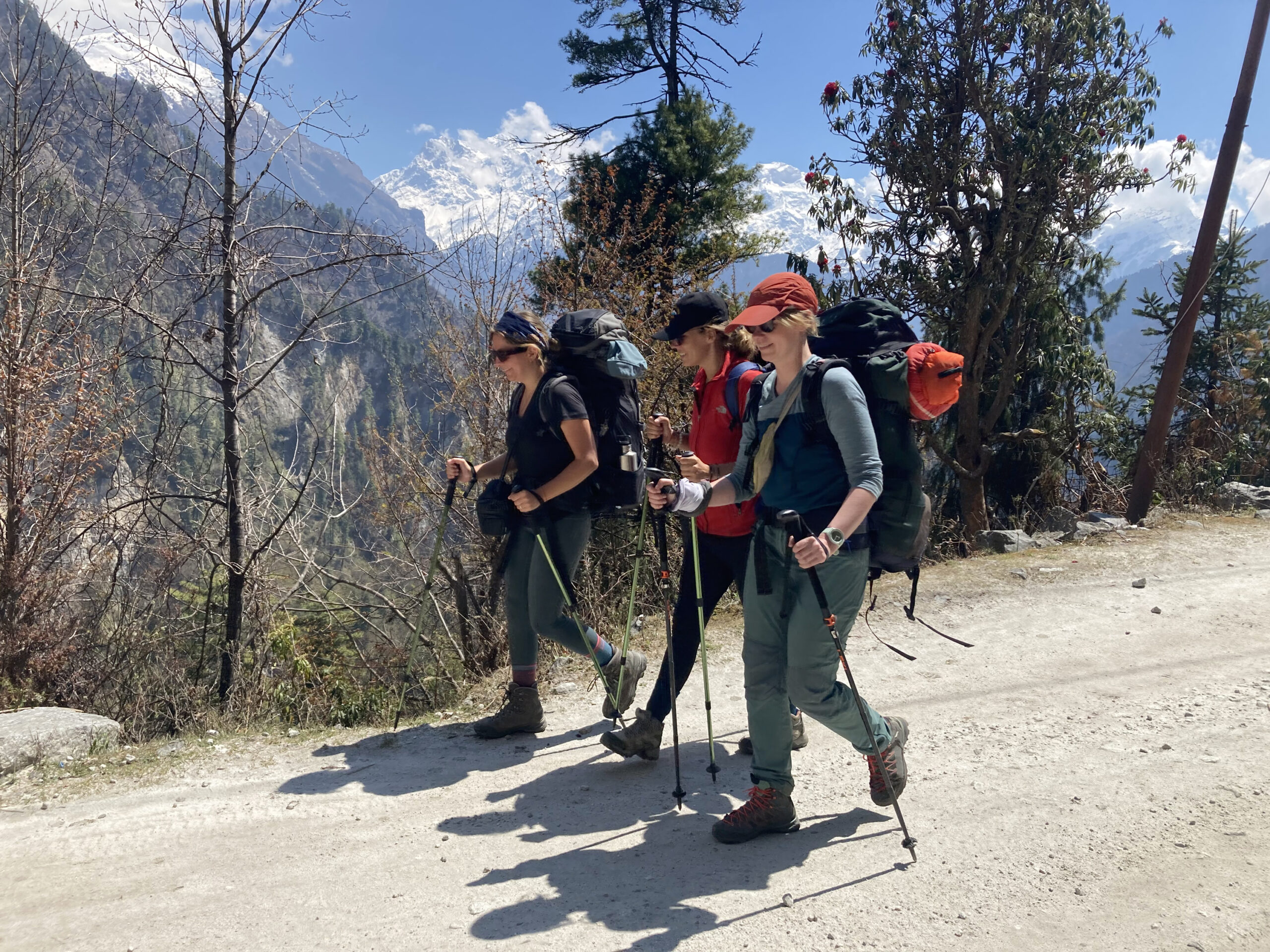SALLERI, SOLUKHUMBU: Carrying a heavy load with the help of a head strap and a sturdy wooden club in hand, they ascended towards the Sagarmatha Base Camp.
Despite the refreshing mountain breeze, their bodies were drenched in sweat under the March sun.
Moreover, the increasing altitude added another layer of challenge to their journey.
Amidst these conditions, they realized the necessity of a short break.
Nawaraj BK, Mingar Tamang, Jeevan Kulung, Darinji Sherpa, and Nawaraj Basnet paused briefly to catch their breath.
While tourists from various corners of the world came here to fulfill their dreams, this team’s dream is solely for generating income to support their families.
The Sagarmatha region serves as a ‘bucket list’ destination for the majority of tourists arriving here to explore adventurous tourism.
This squad is further continuing their journey up to the Khumbu region.
This job, though daunting, is a major means of income for people like them, which provides just Rs 2,000 per day.
“It is really difficult to climb up the sloppy cliff without any load, and imagine the level of hardship to travel through this route carrying a backpack weighing 40 kilos with the tourists,” narrated Nawaraj BK.
“The more we step up, the more altitude issues we feel. It makes the journey more tiring. But as the Light at the End of the Tunnel, we happen to forget once we receive our remunerations as per our hard work, but this does not happen always.”
BK, a married in his early 40s, has been in this occupation for the past one and a half decades. A resident of Bung of Mahakulung rural municipality-1 in Solukhumbu, he is solely dependent on it for running his family.
But his concern is that this job is not available all seasons.
They access it only during the climbing seasons-from September-October to November-December and February-March to April-May.
Once the climbing seasons begin, people like Nawaraj leave home in search of jobs in the Khumbu region.
They receive tourists in Lukla, make a deal, pick up their luggage, and help them reach destinations. This schedule repeats throughout the climbing season. Back home, BK keeps himself busy with farm work.
“Working in minus temperatures in Sagarmatha by risking lives is not sufficient for managing the cost for the family,” he lamented.
As BK said, it takes six to seven days to trek along the route from Lukla, situated at an altitude of 2,860 meters, to the Sagarmatha Base Camp at an altitude of 5,364 meters, and it takes two to three days to return.
On average, they hardly earn Rs 18,000-20,000 per trip, and their lodging and food should be included in this budget.
The net savings are not sufficient to justify their labor.
“The Khumbu region is expensive, and the situation is painful for us. We never imagine affording a high-quality hotel for the night stay; we have to search for low-cost inns.”
Mingmar, who was taking a short respite along with BK, echoed what BK shared.
“Along with the backpack, we have to carry roasted maize grains, rotis and potatoes for food. If we have our meals at hotels from the money that we are paid, then we will not be saving any money to take home,” said Mingmar.
As he said, it’s even difficult to get a place for sleeping when the crowd gets big.
In the higher regions of Khumbu, he said, the porters have to pay anywhere between Rs 500 and Rs 700 per meal.
“No porter gets paid commensurate with the hardships. We take solace in the tips that we get sometimes,” he added.
The porters are the cheapest load carriers in the Khumbu region.
“There are no motorable roads here and transportation by helicopter, yak and jokpe is costly. Porters will be out of work if mountaineers and trekking expedition companies spend large amount of money on transport,” said Jeevan Kulung, another porter at Goraksep.
He said porters from Okhaldhunga, Khotang among other neighbouring districts also come to Khumbu region for work.
Porters are not respected
Porters play important role in the tourism industry in the Sagarmatha region.
The porters are together with the tourists all the time they are in Khumbu area.
It is not easy for every mountaineer to climb the mountains carrying heavy bag down from Lukla.
Whether they are mountaineers or trekkers, they can trek around the Sagarmatha region only with the help of porters.
In several instances, the porters have saved the lives of tourists.
Many tourists have been saved from the jaw of death and returned safe back to their homes, thanks to these porters who are well-acquainted with the climate in Khumbu.
However, despite their key role and highly demanding job, the porters have not got the respect they deserve.
“We carry loads up the mountains. We are worried about our accommodation when it gets dark. We do not get rooms in hotels. Even if we get, they are too expensive for us. So, we have to look for some sheds for accommodation after reaching the destination,” lamented Darinji Sherpa, another porter.
Nawaraj Basnet, who also works as porter, said although all facilities are available for tourists at the hotels, there is no proper accommodation for the porters.
“The way the hoteliers treat us is hurtful. We have been enduring it. The situation is such that nobody will come to our rescue even in difficulties and when we fall ill with high-altitude sickness,” he rued.
Porter House to be built
The Khumbu Pasang Lhamu Rural Municipality has been collecting Rs 25 per person as the fee from porters. However, there are no proper facilities for them.
Mingma Chhiri Sherpa, the rural municipality chairperson, said they have brought the concept of ‘Porter House’, acknowledging the lack of facilities for the porters.
According to him, the Rural Municipality has already taken ahead the process for constructing the Porter House at various places of the Sagarmatha region.
He said the porters will have good food and accommodation facilities at a minimum cost at the Porter House.
“The Rural Municipality has already started the process for constructing the Porter House. Works are being carried out to operate these facilities within some months,” he said.
Mingma, the rural municipality chairperson, said although the porters have no problem for food and accommodation as such in Namche and Lukla areas as there are many rural inns there, they are facing problem in higher places like Thame, Dingboche, Dibuche, Thukla, Goraksep and others.
He expressed the confidence that the food and accommodation problem porters are facing these days will be gone once the Porter House comes into operation at these places.









Comment